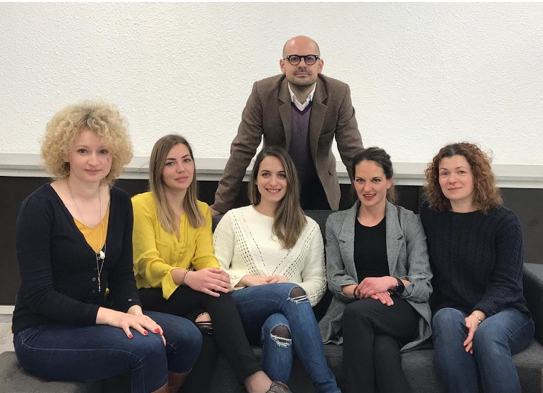 |
| First row (L to R): Jasmina Zivanovic (postdoc), Dunja Petrovic (PhD student), Emilia Kouroussis (PhD student), Biljana Bursac (postdoc), Sonja Schott-Roux (research engineer) Second row: Milos Filipovic |
The Signaling by Gasotransmitters group was formed in 2016 when Dr. Filipovic moved from Friedrich-Alexander University Erlangen-Nuremberg to join the Institut de Biochimie et Génétique Cellulaires - UMR 5095 (IBGC) at the French National Center for Scientific Research (CNRS) and University of Bordeaux. Young, dynamic, international and interdisciplinary, our group brings together medicinal chemists, biologists and biochemists that work on understanding how posttranslational modifications of cysteine control cellular functions.
Signaling by gaseous molecules started with the discovery of physiological roles of nitric oxide (NO) and then expanded to carbon monoxide and recently to hydrogen sulfide (H2S). Prior to moving to France, our team was particularly interested in cross-talk between NO and hydrogen sulfide, which led to the discovery of several small bioinorganic molecules that could have new physiological functions such as HSNO2, HSNO and HNO. By using sensitive chemical and biochemical analytical methods, knock-out mouse models, electrophysiology and high-resolution mass spectrometry we demonstrated the NO+H2S-dependent formation of HNO results in activation of TRPA1-CGRP cascade for neurovascular control of blood pressure.
In the past couple of years, we have become more focused on understanding how H2S controls cellular function via protein persulfidation (or S-sulfhydration). In order to really understand their role in signaling, one must selectively label protein persulfides, and that represents a major obstacle due to their instability and similarity to cysteine residues. Our team uses a chemistry-driven approach to solve complex biological problems and therefore combines inorganic and organic chemistry with biochemistry and cell biology to design new tools to study H2S signalling. For example, we developed a new method to selectively label protein persulfides, and this approach helped us understand how PSSH levels are controlled in the cells. Our results pointed out that one of the main causes of persulfide formation is the reaction of sulfenic acids with H2S. Furthermore, just as phosphorylation is controlled by dephosphorylation, persulfidation is controlled by depersulfidation. Using our improved tag-switch method we could show that thioredoxin system efficiently cleaves persulfides in cells and humans.
Our current work strongly suggests that persulfidation is an evolutionarily conserved modification (from bacteria to humans) controlled by the transsulfuration pathway and cysteine catabolism. Being a young group that consists of young researchers, we embarked on a journey of deciphering how to stay “forever young”. Combining the work on C. elegans, D. melanogaster, mice and humans we are trying to understand how H2S controls aging and how aging controls H2S levels, hoping to come up with pharmacological interventions to slow down the aging process. It appears that beneficial effects of dietary/calorie restriction are directly linked to the persulfidation levels.
Despite existing for only a couple of years, our team has already managed to obtain ATIP-Avenir, Idex Junior Chair and Équipes FRM labels. As we tend to use a multidisciplinary approach in our research, which combines the use of all available techniques, improvement of existing techniques, and the creation of the new ones, we strongly rely on our collaborations with researchers from around the world (USA, UK, Germany, Spain, Uruguay, Sweden, Serbia).
Besides working hard, we tend to regularly enjoy the advantages of being in the world wine capital, combining local “Entre-deux-mers” with oysters from Arcachon or “Saint-Emillion” with “magret de canard”. Whether because of that or our scientific expertise, we are constantly hosting the researchers coming from different countries, which we always enjoy.